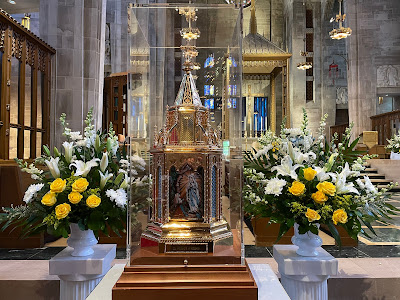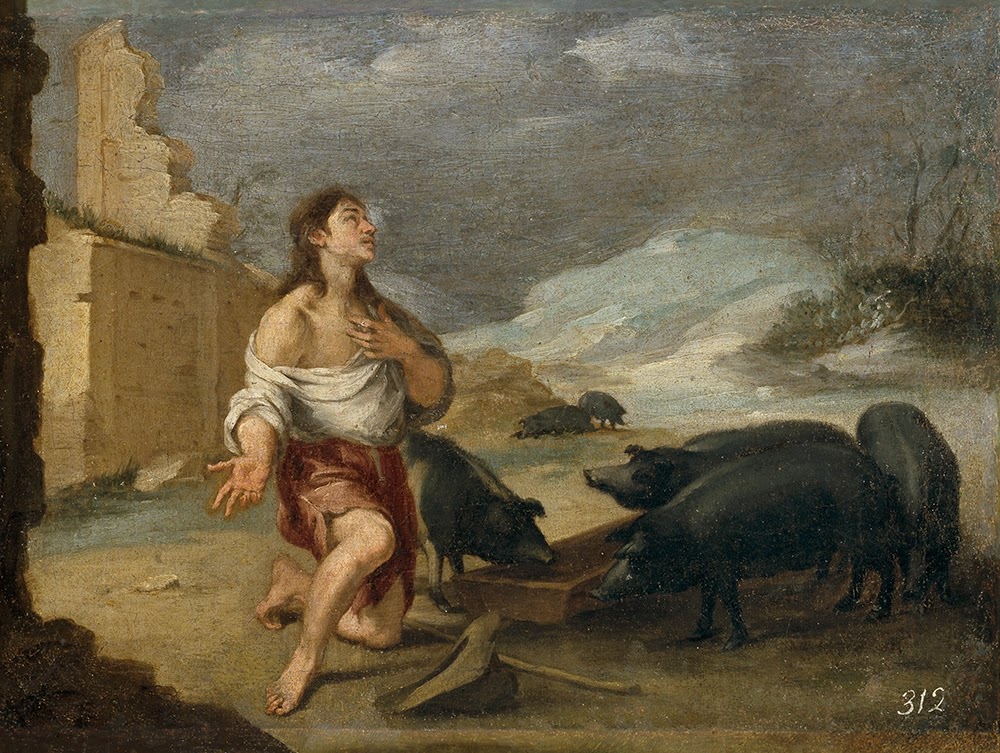5th Sunday of Easter (C)
Nestled in the foothills of the French Pyrenees, in the middle of the 19th century, one would not have expected anything great to happen in the small village of Lourdes. Even less would anything remarkable have been expected of the sickly eldest daughter of the town’s miller, lazy and drunk, whose vices forced his family to live in the foul poverty of a disused prison and at least one of his children to eat the church’s candle wax in lieu of proper food. Yet the God who prefers the weak of the world to the shame of the strong (cf. 1 Cor. 1:27) chose this humble town and this poor family – the Soubirous – to cast down the mighty from their thrones and to lift up the lowly (cf. Lk. 1:52) by sending she, whose words they are, to visit Lourdes by appearing eighteen times in 1858 to the simple and illiterate peasant girl named Bernadette.
Bernadette bears testimony, like all the saints before and after her, to the truth of Paul and Barnabas’s words recorded in the Book of Acts: “It is necessary for us to undergo many hardships to enter the kingdom of God.” When those chosen disciples stood before the people they bore the marks of the hardships they had endured. Paul, for his part, had been stoned and dragged out of the city by those who thought he was dead (cf. Acts 14:19). Now he stands in Antioch, bruised and bandaged, as a living witness to the hardships that must be endured by all who desire to enter the kingdom of God.
Today in this Cathedral of Mary Our Queen, Bernadette stands before us to bear the very same testimony. Although not a martyr in the same sense as Paul, she, like him, had to undergo many hardships in her short life, and many of those hardships – ironically enough – were the cause of Aqueró, Bernadette’s name for “this thing”, the unknown Lady in white, who was appearing to her. She was at first interrogated by her sister, her mother, and her friends. As the visions continued, she found herself under the scrutiny of the sisters at the convent school, her parish priest, bishops, and the police inspector, who ordered her not to return to the grotto. She was even threatened at least once with prison. Virtually none of those in authority believed her, for Bernadette hardly knew her Catechism. Yet crowds in hundreds and in thousands would gather at the grotto to see Bernadette taken up in ecstasy as she prayed her rosary and then after would rush her and try to kiss her, as if she possessed some miraculous power. Even after the visions had ceased, Bernadette was inundated with constant questions even as she continued her lifelong physical suffering.
At one point, in the midst of the visions, Our Lady said to Bernadette, “I do not promise to make you happy in this world, but in the next.” And she makes the same promise to each of us. The Book of Revelation describes the new heaven and the new earth that are to come as the place where “there shall be no more death or mourning, wailing or pain, for the old order” – our order – will have “passed away.” Death and mourning, wailing and pain, which are the conditions of this world, are not the conditions for happiness. It will be only when these things pass away, when the One seated on the throne makes all things new, when the conditions for perfect and eternal happiness will be fulfilled, in the kingdom that will last for all ages.
We may ask: where does that leave us now, in this valley of tears? Should we resign ourselves to mundane misery, wallow in self-pity, and simply grit our teeth and endure whatever tribulation must come to pass until the day of judgement? Hardly. The Gospel in general, and this Sunday’s Gospel passage in particular, do not let us get off so easily. For it would, indeed, be easier to stick our heads in the sand and avoid embracing the demand the Gospel lays upon us. And that demand is this: “I give you a new commandment: love one another. As I have loved you, so you also should love one another.” As we traverse through the valley of tears of this earth, in which we will undergo many hardships and face death and mourning, wailing and pain, Christ makes the condition of being his disciple the radical call, in the midst of it all, to love.
And the call to love with the sacrificial love of Christ’s own Heart is accompanied with the promise, not of misery and sorrow, but of joy: “Truly, truly, I say to you, you will weep and lament, but the world will rejoice; you will be sorrowful, but your sorrow will turn to joy… So you have sorrow now, but I will see you again and your hearts will rejoice, and no one will take your joy from you” (Jn. 16:20, 22). Despite the sufferings she endured, no account of Bernadette Soubirous’ life describes her as dour or sad. Before her death at the age of thirty-five she said, “To obey is to love! To suffer in silence for Christ is joy! To love sincerely is to give everything, even grief.” What, I think, she means is that to turn everything we experience over to love turns any hardship into joy. So too did the Apostles leave the Sanhedrin “rejoicing that they were counted worthy to suffer dishonor for the name” of Jesus (Acts 5:41).
Christ’s call to love does not allow us to run from this world and its suffering but to embrace them both. Bernadette was canonized a saint not for the miraculous healings associated with her, nor is she venerated because her grotto at Lourdes became a sanctuary for pilgrims from far and wide or because she was the recipient of eighteen apparitions of Our Lady. No, we call Bernadette a saint because she loved. She heeded Christ’s commandment to love others as she knew herself to be loved by him.
And the love that she showed others in her life is the love that makes Christianity credible. Hans Urs von Balthasar once wrote, “The sole credibility of the Church Christ founded lies… in the saints, as those who sought to set all things on the love of Christ alone.”[1] The Church is credible because of her saints because it is by their love that we know that they were and are Christ’s disciples, so that by the love they share, they have become one, as Jesus himself prayed that his disciples would be one: “even as you, Father, are in me, and I in you, that they also may be in us, so that the world may believe that you have sent me” (Jn. 17:23). We honor Saint Bernadette and ask for her prayers because, in this life and the next, she was and is united with Christ.
Her mortal remains are before us today as a witness to the love of Christ: a love which is stronger than death and mourning, wailing and pain; a love which alone turns all sorrow to joy. She and Our Lady pray for us that we too may be witnesses before the world of the love of Christ, that others may know that we are also are Christ’s disciples by the love we practice that unites us to him.
In this life, we will love only imperfectly and incompletely. At times, the sorrow we endure will get the better of us, and our pride will stifle our ability to love. And yet, all the same, with the acts of love that we show every day, great and small, we and the world glimpse, however faintly, along with John, that “holy city, a new Jerusalem, coming down out of heaven from God” breaking into this world of pain and tears. Our love, which is Christ’s love, advances his kingdom, the Church, and changes the world, in the hopeful anticipation of when the old order will pass away and the new order – the order of perfect and eternal love – will at last come to reign.
Our Lady of Lourdes and Saint Bernadette, teach us how to love, through all suffering, to know the joy of Our Lord’s Resurrection, and so be faithful sons and daughters of his Church, to bear witness before the world of the love that will, in the end, triumph and make all things new.

-1.jpg)


Comments
Post a Comment